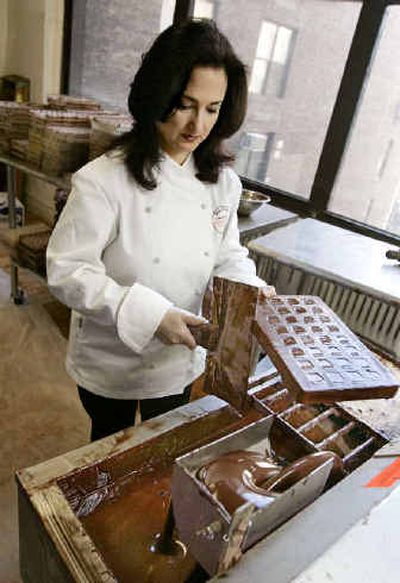On their own

NEW YORK – Joan Coukos’ transition from international banker to artisanal chocolatier began when she found a set of chocolate molds at an antique market in Belgium.
“I felt like I was on the verge of some discovery,” said Coukos. “I couldn’t put them down.”
She began gobbling books on chocolate and making chocolate once a month to bring to work. When she left banking in the fall of 2001, chocolate became her full-time job. She went to food networking events and chocolate trade shows. Banks and headhunters called with job leads, but she turned them down – she was up to her elbows in chocolate. Then, in 2003, she started her New York-based company, Chocolat Moderne.
It’s a dream so many people have: Chuck your day job and do the thing you’re most passionate about. A handful of those who leave cubicles to be entrepreneurs succeed wildly, such as handbag maker Kate Spade, who quit Mademoiselle magazine to start her business and now has 15 retail stores and 315 employees.
Coukos, whose chocolates are sold online and in upscale food stores, is energized by entrepreneurship.
“I wake up in the morning and I wish I was immediately at work,” Coukos said. “I can’t wait to get here.”
For most day-job refugees, though, running the show means small victories mixed with sleepless nights, even when they find success.
Rick Field, a former video director and producer, is now a professional pickle maker with a growing reputation – people bring their friends to his New York farmers market stand first thing in the morning to try a sample. But he’s found insomnia to be an occupational hazard.
“When I was in TV, I generally slept very well,” said Field, whose company is called Rick’s Picks. “I don’t sleep so well anymore, really. When I was in TV, even though I was running my own projects, there was always someone I was reporting to. Now, I am reporting only to myself.”
Those who take the plunge say being your own boss is immensely difficult, but intensely gratifying.
“It keeps me thin, between the worrying and the lean times,” said Kate Stein, 32, who owns Over the Top Tiaras, a Boston company that sells tiaras online. She founded the business after a tiara she had made for her sister was a hit at a party and after she was laid off from Lycos Inc. in 2001.
“Do I miss corporate life?” Stein said. “Every time I write a check for my health insurance, I miss it very much.”
Mark Henricks, author of “Not Just a Living: The Complete Guide to Creating a Business that Gives You a Life,” said people thinking about leaving their jobs should, “start now, but start small. Find some customers who will buy what you’re selling.”
Despite the success stories, the vast majority of people who dream of starting a business don’t do it.
“A lot of people have great ideas; I’ve heard them all,” said Monica Nassif, 48, who left her job at Dayton Hudson Corp., now Target Corp., in the 1980s to start her own marketing consulting firm in Minneapolis.
“I tell people, ‘When you come back with a business plan, I will help you.’ You want to know how many have come back with a business plan? Zero.”